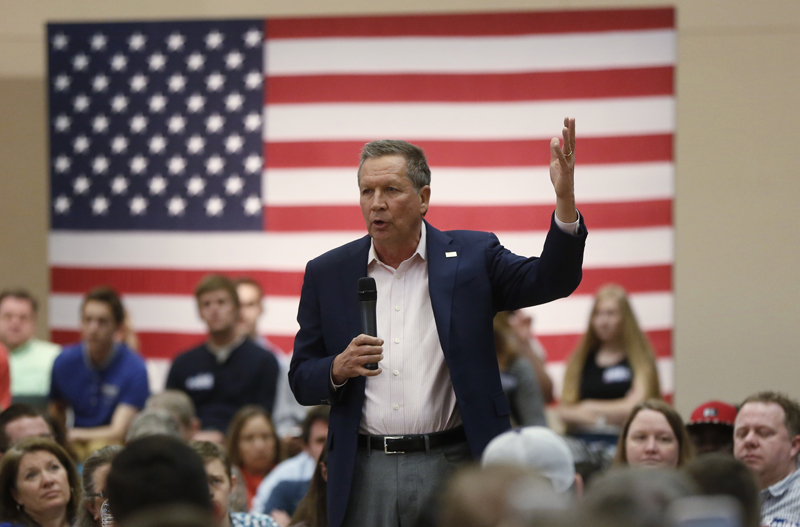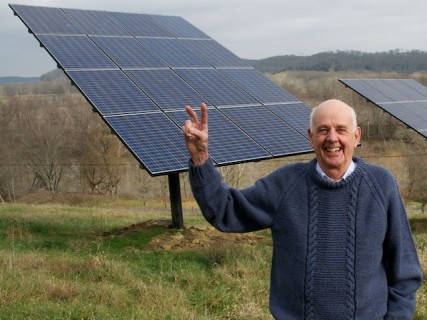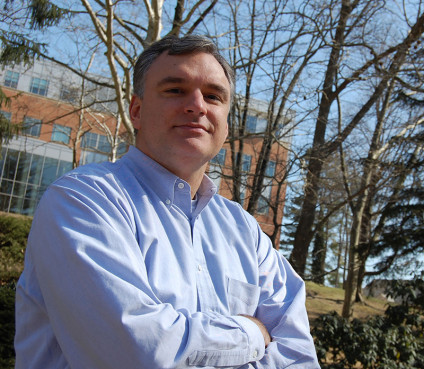
Republican U.S. presidential candidate John Kasich addresses a campaign town hall event in Orem, Utah on March 18, 2016. Photo courtesy of REUTERS/Jim Urquhart
*Editors: This photo may only be republished with RNS-FEA-COLUMN, originally transmitted on March 31, 2016.
(RNS) Republican Party leaders want John Kasich to exit the GOP primary race. The governor of Ohio is drawing too many votes away from Ted Cruz and weakening the Texas senator’s chances of stopping Donald Trump from winning the party’s nomination for president.
At the moment, Kasich is polling well in Wisconsin, the site of the next big GOP primary, on Tuesday (April 5), but he still trails Trump and Cruz by about 10 percentage points.
Whatever happens to the Kasich candidacy, his approach to presidential politics has been a breath of fresh air amid an ugly, cantankerous and divisive GOP race. This is especially the case in the way that he applies his Christian faith to matters of public policy.
Trump is winning evangelicals in large numbers by appealing to their fears. A recent report by the Public Religion Research Institute suggests that white evangelicals, more than any other religious group in the country, believe that immigration is threatening “American customs and values.”
Trump has become the champion of white evangelicals by taking a page from the playbook of the Know-Nothings, a pre-Civil War political party made up of Protestant nationalists with an anti-immigration agenda. Trump is here to defend Christian America from strangers who want to undermine it.
READ: Americans see immigrants more favorably than do Trump, Cruz
Cruz’s religious approach to politics is not too far removed from Trump. Cruz also plays on the anxieties of American evangelicals. Religious liberty is under attack. The death of Antonin Scalia means abortion and same-sex marriage may never be exterminated from the republic. Muslims are at the gate. The culture war for the soul of America continues to rage and Cruz is the evangelical knight in shining armor.
Kasich offers a different approach.
His campaign focuses on the idea that human beings are created and called for community. He likes to say that people are “special,” a belief that reflects the Judeo-Christian idea that men and women have dignity and worth because they are created in God’s image. When Americans realize that all men and women are exceptional, the natural result, in Kasich’s view, will be the renewal of neighborhoods and communities.

Wendell Berry stands before the solar panels on his farm in Henry County, Ky.
Kasich seldom talks specifically about the thinkers who have influenced him, but if I had to guess I would say his campaign is driven by a healthy dose of Wendell Berry localism, the so-called Front Porch conservatism, Catholic social teaching and the agenda for “changing the world” made popular by University of Virginia sociologist James Davison Hunter.
When Kasich talks about his upbringing in the working-class western Pennsylvania town of McKees Rocks, he sounds a lot like a character from the agrarian writer Berry’s fictional town of Port William, Ky. The comparison is not perfect. Port William was a farming town. McKees Rocks was a steel town. But a palpable sense of place and face-to-face community defined everyday life in these towns.
When Kasich talks about his father, the town mailman “who stuck his nose in everybody’s business,” I can’t help but think of Jayber Crow, the Port William barber whose shop served as a center of male sociability in Berry’s fictional town.
READ: Obama at last prayer breakfast: ‘We heal hatred with love’
Berry’s Port William novels instill in readers a longing to return to a world that no longer exists. So do Kasich’s stories of life in McKees Rocks. Nostalgia is a powerful thing. It taps into some of our deepest longings for the good life. And it is a very effective political tool.
Berry is a favorite among a group of conservative thinkers who promote the idea of America as a “front porch republic.” These conservatives defend traditional values. They oppose abortion and same-sex marriage. They are capitalists but also believe that consumerism, with its glorification of individualism, materialism and selfishness, undermines the kinds of communities where real human flourishing can take place.
As Cruz and Trump frame their campaigns in terms of defending individual rights and liberties, Kasich worries about what self-interest is doing to American neighborhoods. He certainly defends the religious and political rights that naturally flow from his belief in human dignity, but he seems to have little use for men and women who do not take seriously their duties to each other.
Of all the candidates competing for the presidency — both Democrats and Republicans — Kasich is the closest to embodying the social teachings of the Catholic Church.
Ironically, Kasich’s spiritual journey has led him away from the church of his western Pennsylvania childhood. When his parents died in a car accident in 1987, he had a conversion experience that ultimately led him to a fellowship of evangelical Anglicans who separated from the theologically liberal-minded Episcopal Church.
But apparently something from Kasich’s Catholic upbringing — perhaps it was all those homilies he heard as an altar boy — has stayed with him. Like Pope Francis, he is opposed to abortion and same-sex marriage but does not use these beliefs as political wedge issues. Kasich would rather talk about the care of the poor and the vulnerable. He believes that the federal government has a role to play in American life, but many of his statements about healing neighborhoods sound a lot like the principle of subsidiarity, the Catholic belief that social problems are best dealt with at the local level.
READ: Ted Cruz’s campaign is fueled by a dominionist vision for America (COMMENTARY)
Kasich or someone in his campaign must have read Hunter’s book “To Change the World: The Irony, Tragedy, & Possibility of Christianity in the Late Modern World.” Hunter argues that to change the world, Christians need to practice what he calls “faithful presence.”

John Fea teaches American history at Messiah College in Mechanicsburg, PA. He is the author of “The Bible Cause: A History of the American Bible Society (Oxford University Press, 2016).” He blogs daily at www.thewayofimprovement.com. Photo courtesy of John Fea
Like Berry, the Front Porchers and the Catholic Church, Hunter calls for Americans to “give priority to what is right in front of us,” for “it is here, through the joys, sufferings, hopes, disappointments, concerns, desires, and worries of the people with whom we are in long-term and close relationships — family, neighbors, and co-workers” — that we learn virtues such as “forgiveness, humility, kindness, hospitality, and charity.” These are the kinds of virtues Kasich believes will strengthen America.
Hunter is skeptical that the world can be changed through politics. We will see if Kasich can prove him wrong. Whether he can pull off a political miracle is yet to be seen, but American evangelicals can learn a lot from his message.
(John Fea teaches American history at Messiah College in Mechanicsburg, Pa. He is the author of “The Bible Cause: A History of the American Bible Society” and blogs daily at thewayofimprovement.com. Follow him on Twitter @johnfea1)




